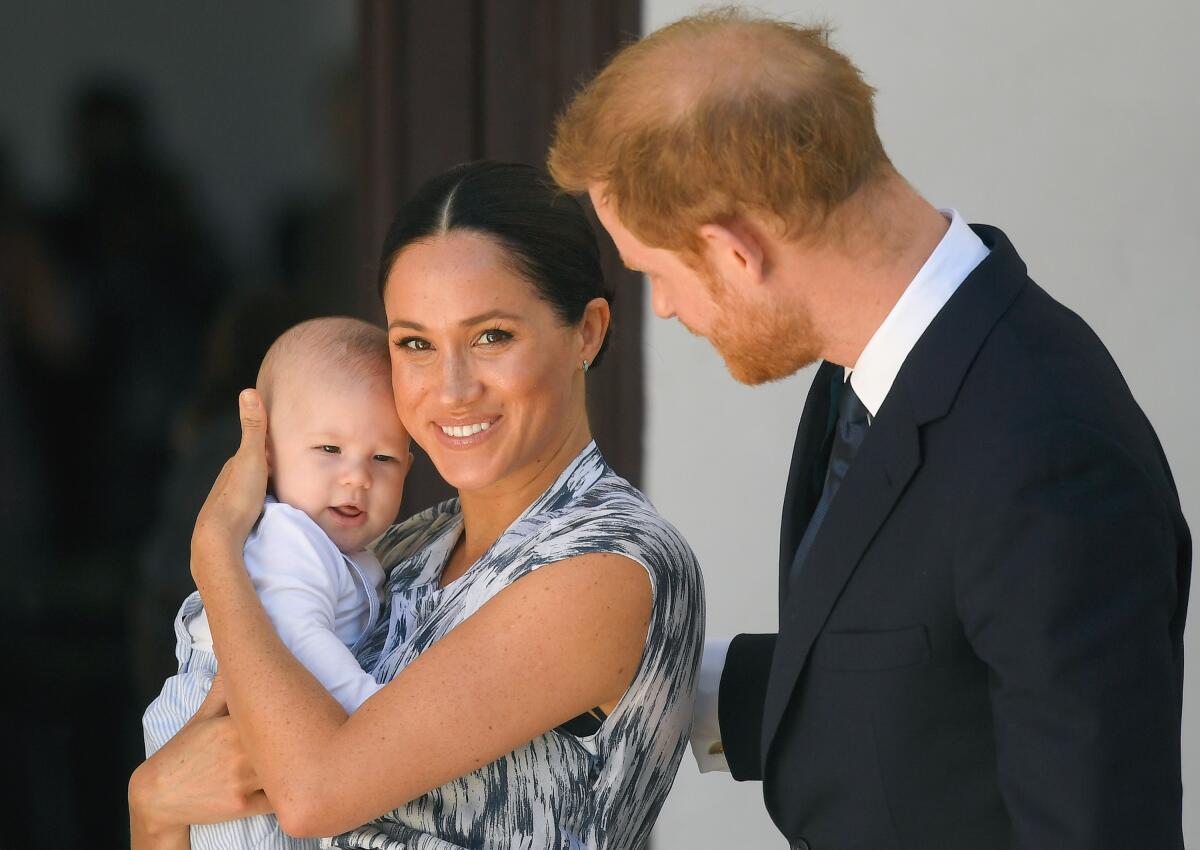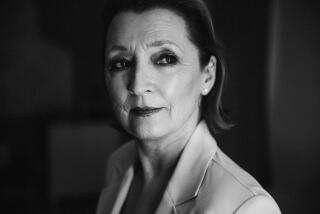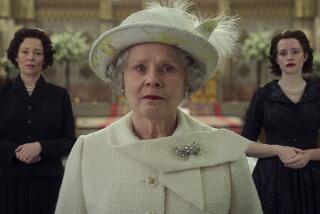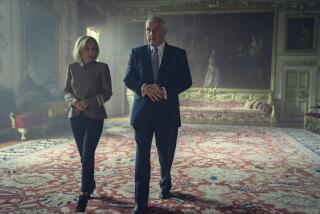Column: What ‘The Crown’ can teach us about Meghan Markle’s tabloid war

- Share via
Here’s what I want to know: What does Olivia Colman think of Meghan Markle? Everyone else on the planet has certainly weighed in.
Last week, when British network ITV released a clip from “Harry & Meghan: An African Journey” in which Markle admitted, in terms as vague as “challenging” and “a lot,” that life as a royal has been a bit more than she bargained for, they undoubtedly knew it would be international news. Everything the royal family does is news, especially the bits that expose how hard it is to be part of a family in which everything you do is news.
Especially when you are Meghan Markle, the first biracial, previously divorced American addition.
So when, during one of the clips, she thanked her interviewer, ITV News anchor Tom Bradby, for asking because “not many people have asked if I’m OK,” the crowd, not surprisingly, went wild.
Every media outlet, including this one, reported on the interview in which Markle seemed very emotional (or at least as emotional as a person can get while being interviewed, weirdly, in the middle of a lawn). Ever since her engagement to Prince Harry was announced, Markle has been the subject of often intensely unfriendly and more than occasionally racist British-tabloid scrutiny approaching the levels that caused so much international breast-beating after Harry’s mother, Princess Diana, was literally hounded to death by paparazzi in 1997.
With Diana in mind, the royal family has, in fact, made efforts; Buckingham Palace and Prince Harry have publicly condemned portions of the British press for relentless and racist coverage of Markle, and the couple recently sued the tabloids after a letter from Markle to her father was published. (Harry is also suing the owners of the Sun and Mirror over phone hacking.)
Still, after seeing the pain in Markle’s eyes as she spoke of her “vulnerability,” American women began hatching Twitter plots to bring her home (where, for some reason, they believe she will not encounter racism or tabloid cruelty).
After the full interview aired Sunday night on ITV (it will air on ABC Wednesday night), the anti-Meghan contingent weighed in, chastising both the Duchess and Duke of Sussex for making poor-little-rich-kids complaints and, perhaps the even deadlier sin, airing royal dirty laundry. (Harry appears to admit in one interview that he and Prince William are not as close as they once were — scandalous!)
On Monday, there were reports that Prince William and residents of the palace were very worried about, depending on the source, the state of the couple’s mental health or the impact of their behavior on the monarchy. Either way, as is traditional, the wife received much of the blame (see also Diana Spencer, Sarah Ferguson and all spouses of Henry VIII). In one interview, Prince Harry biographer Angela Levin accused Markle of back-stabbing and said that by sharing the fact that all was not bliss, Markle was making her husband feel “emasculated.”
So when Hugh Grant speaks out about the tabloids, he is encouraged to run for Parliament; when Markle mentions it, she is stabbing her husband, who by the way is suing the tabloids in question, in the back.
It will be interesting to see how Netflix will work all this into its promotion for the third season of “The Crown,” in which Colman replaces Claire Foy as Elizabeth II.
Like most cinematic stories about British royalty (especially those designed to delight American audiences), “The Crown” is an attempt to humanize the royal family, which is depicted as continually walking a tightrope of national necessity and obsolescence. The streamer used Harry and Meghan’s wedding to full advantage, taking out innumerable ads around the event (including in this paper) during its Season 2 Emmys campaign. The current conversation about Markle and to a lesser extent Prince Harry, is absolutely in keeping with a series that has in often exquisite detail examined how the pressures of royal life turned Elizabeth Windsor into the Queen, and all the personal stultification and emotional calcification that process required.
Indeed, much of Season 3, which drops on Nov. 17 and chronicles 1964 through 1976, deals with the toll that years of emotional suppression have taken on Elizabeth and the family’s perpetual and often disastrous dance with the press and an early attempt at a documentary about royal life. Although the series does not shy away from its characters’ shortcomings, its overall tone is one of sympathy — these people, and they are people, have been put through birth or marriage in a difficult if richly appointed situation.
The queen is, as people in “The Crown” repeatedly tell her, more edifice than human, a bridge between the ancient world of crowns, castles and rigidly enforced class systems and the modern one, with its celebrity, 24-hour news cycle and fractious propulsion toward equality. To turn a woman and her family into a bridge requires near-geologic pressure, and even if the whole thing doesn’t come tumbling down, fractures will occur.
The troubled royal life and tragic death of Princess Diana — which begins to hover at the edge of “The Crown” as Prince Charles becomes an adult — was, or so it seemed at the time, a seismic fracture, replacing gilt with guilt.
But now it’s hard to tell. Although “The Crown” tells the story of the family that still occupies Buckingham Palace, royal humanity appears to be more audience-friendly when it is scripted and historical. Pro and con, the reaction to the personal “revelations” in “Harry & Meghan” seem more than a little hysterical. The only real news out of the “bombshell” admissions is that they are considered bombshells. By the standards of modern television, both Meghan and Harry’s intimations that life is not a bed of roses for British royalty, even with the splendid new house and private air travel, are very mild, and they are only saying what everyone already knows.
Yes, the members of the royal family are by one definition highly paid public servants and celebrities, which makes them subject to media attention and criticism. But Markle has, inarguably, been subjected to personal and racial persecution by the tabloids and to deny or remain silent about this would make the couple, and the royal family, complicit.
Far from whining or backstabbing or airing dirty laundry, the two are using the platform they have to speak out against racism and vitriol, which are very different things from legitimate criticism of public figures.
The question of whether the monarchy survives beyond Elizabeth II is open to debate and up to the British citizenry. But while it remains in place, and the continued subject of fascination for millions, certainly anything any member of the royal family can do to remind people of the difference between criticism and hate is for the good of the country and the world.
Meanwhile, we can all take a moment and wonder who should eventually play Markle in “The Crown.”
More to Read
The biggest entertainment stories
Get our big stories about Hollywood, film, television, music, arts, culture and more right in your inbox as soon as they publish.
You may occasionally receive promotional content from the Los Angeles Times.











